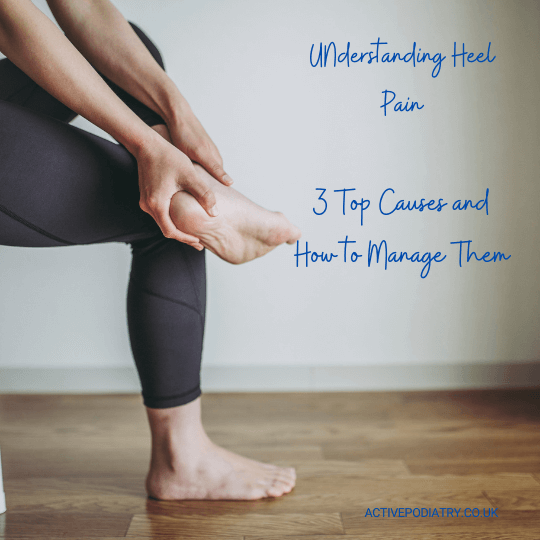Understanding Heel Pain: 3 Top Causes and How to Manage Them

Heel pain can be a debilitating issue, affecting people of all ages and activity levels. Whether you're an athlete, a professional who spends long hours on your feet, or simply someone who enjoys walking, heel pain can significantly impact your daily life. Understanding the underlying causes of heel pain is crucial for effective management and prevention. Here are three of the main causes of heel pain and strategies for addressing them:
-
Plantar Fasciitis:
Plantar fasciitis is perhaps the most common cause of heel pain. It occurs when the plantar fascia, a thick band of tissue that runs across the bottom of your foot, becomes inflamed or irritated. This inflammation can result from excessive strain, overuse, or biomechanical issues such as flat feet or high arches. People with plantar fasciitis often experience sharp pain in the heel, especially with the first steps in the morning or after periods of rest.
Management:
- Rest: Avoid activities that exacerbate pain and provide ample rest for the foot.
- Stretching: Perform gentle stretching exercises to loosen the plantar fascia and calf muscles.
- Supportive Footwear: Wear shoes with good arch support and cushioning to reduce strain on the plantar fascia.
- Orthotic Inserts: Custom or over-the-counter orthotic inserts can provide additional support and alignment for the foot.
-
Achilles Tendinitis:
The Achilles tendon, located at the back of the heel, connects the calf muscles to the heel bone. Achilles tendinitis occurs when this tendon becomes inflamed due to repetitive stress or overuse. Runners, athletes who engage in jumping sports, and individuals with tight calf muscles are particularly susceptible to this condition. Symptoms include pain and stiffness in the back of the heel, especially during physical activity or upon waking in the morning.
Management:
- Rest and Ice: Allow the tendon to rest and apply ice in the early stages to reduce inflammation and pain. Heat is better in the long term to increase blood flow to the injured tendon.
- Stretching: Perform gentle calf stretches to improve flexibility and relieve tension on the Achilles tendon.
- Eccentric Exercises: Gradually incorporate eccentric strengthening exercises such as heel drops below a step to promote tendon healing and resilience. However avoid heel drops below a step if the pain is near the attachment of the tendon to the heel.
- Proper Footwear: Wear supportive shoes with adequate cushioning and heel elevation or ‘heel drop’ to reduce strain on the Achilles tendon.
-
Heel Spurs:
Heel spurs are bony protrusions that develop on the underside of the heel bone, often as a result of long-term plantar fasciitis or excessive stress on the foot. While heel spurs themselves may not cause pain, they can irritate surrounding tissues such as the plantar fascia, leading to heel discomfort and inflammation.
Management:
- Orthotics: Custom orthotic inserts can redistribute pressure on the foot and alleviate discomfort caused by heel spurs.
- Stretching: Engage in regular stretching exercises to relieve tension on the plantar fascia and reduce irritation of the heel spur.
- Shockwave Therapy: In some cases, shockwave therapy may be recommended to stimulate healing and reduce pain associated with heel spurs.
- Proper Foot Mechanics: Maintain proper foot alignment and avoid activities that exacerbate heel pain, such as prolonged standing or high-impact exercises.
How can we help?
In conclusion, heel pain can stem from various underlying causes including the above, each requiring specific management strategies. While self-care measures such as rest, stretching, and supportive footwear can alleviate mild heel pain, persistent or severe symptoms warrant medical evaluation by a healthcare professional such as myself. By helping you to understand the causes of your heel pain following a thorough assessment and implementing appropriate interventions, I can help you to effectively manage your heel pain and prevent recurrence, keeping you active and pain-free in the long term.
If you are not sure what is causing your heel pain, or have lost your way trying to manage it, give me a call so I can help you.